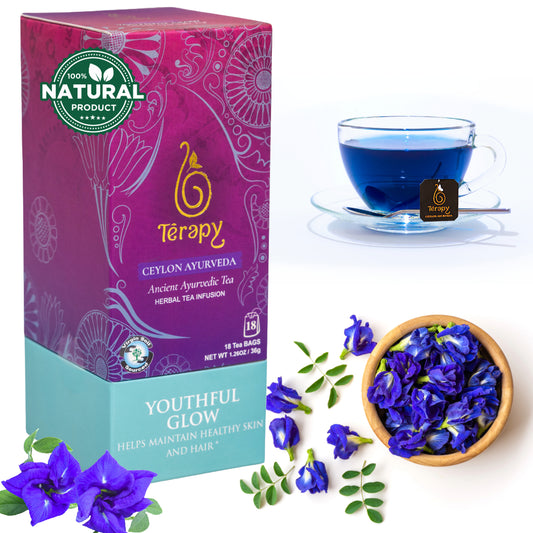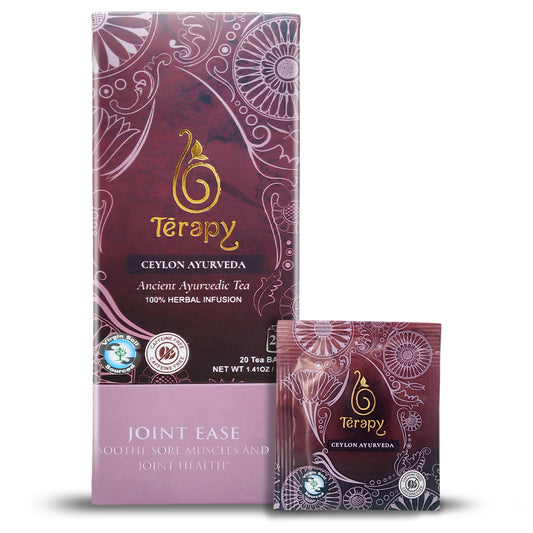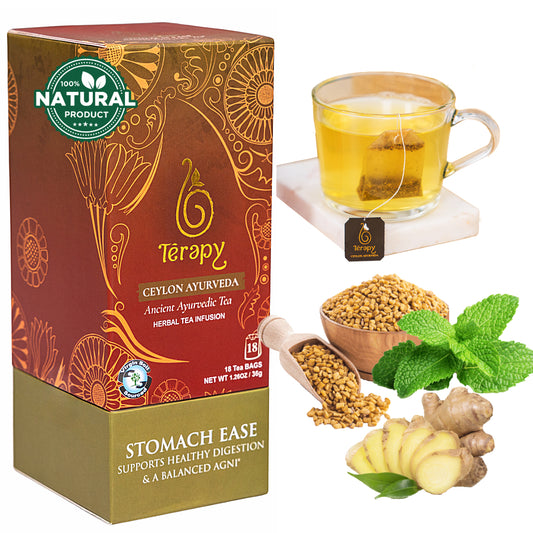Ceylon Cinnamon: A Precious Herbal Ingredient in Ayurveda Medicine
Cinnamon, a fragrant spice derived from the bark of the Cinnamomum tree, has been prized for thousands of years for its distinct flavor, aroma, and medicinal properties. While many people are familiar with the common "cassia cinnamon" found in supermarkets, there exists another, more esteemed variety known as Cinnamomum verum, or Ceylon cinnamon. Known as “true cinnamon,” Ceylon cinnamon is considered more beneficial and safer for regular use, particularly in Ayurvedic medicine, where it holds a prominent place as a healing herb.
What is Ceylon Cinnamon?

Ceylon cinnamon, native to Sri Lanka, is recognized by its thin, soft, and flaky bark that can be easily rolled into multiple layers. Unlike cassia cinnamon, which has a hard, thick bark, Ceylon cinnamon's delicate nature makes it easy to grind into powder. The aromatic flavor of Ceylon cinnamon is subtle and sweet, in contrast to the more pungent taste of cassia.
In Ayurveda, Ceylon cinnamon is classified as a warming herb that balances the body's "Vata" and "Kapha" doshas. It is believed to stimulate digestion, promote circulation, and offer several therapeutic benefits, making it an integral part of Ayurvedic formulations.
The Ayurvedic Use of Ceylon Cinnamon
In Ayurvedic medicine, Ceylon cinnamon is considered a versatile herb with a broad range of applications. Its uses extend across physical, emotional, and spiritual health. Some of the traditional Ayurvedic uses of Ceylon cinnamon include:
- Digestive Health: Ceylon cinnamon is widely used to improve digestion and address issues like bloating, indigestion, and poor appetite. It helps to stimulate digestive enzymes, increase gastric fire (Agni), and promote healthy bowel movements.
- Blood Sugar Regulation: Ceylon cinnamon has a reputation for its ability to regulate blood sugar levels. It has been used in Ayurveda as an effective remedy for managing diabetes by improving insulin sensitivity and reducing glucose spikes.
- Detoxification and Weight Loss: Ceylon cinnamon is often included in detox programs, as it helps to flush out toxins from the body. It is also believed to promote healthy weight loss by boosting metabolism and reducing fat accumulation.
- Circulatory Health: Ceylon cinnamon enhances circulation and can help alleviate conditions like cold extremities, poor blood flow, and varicose veins. Its warming properties stimulate blood flow and open up channels for better circulation throughout the body.
- Antibacterial and Anti-inflammatory Properties: This herb possesses strong antibacterial and anti-inflammatory qualities, which make it effective in treating infections, reducing inflammation, and promoting overall immune health. It is used in topical applications for wounds and skin conditions.
Ceylon Cinnamon vs. Cassia Cinnamon: A Comparison
While both Ceylon cinnamon and cassia cinnamon belong to the same plant family, they differ significantly in their chemical composition, health benefits, and safety profile.
1. Cinnamaldehyde Content
Cinnamaldehyde is the compound responsible for cinnamon’s characteristic taste and aroma. Cassia cinnamon contains a higher concentration of cinnamaldehyde, which gives it a more intense flavor but also poses potential health risks when consumed in large amounts. The high level of cinnamaldehyde in cassia cinnamon can be irritating to the liver and kidneys, especially when taken in excess.
Ceylon cinnamon, on the other hand, has a much lower concentration of cinnamaldehyde. This makes it safer for regular consumption and a preferred choice in Ayurvedic medicine for long-term use.
2. Coumarin Levels
The most significant difference between Ceylon cinnamon and cassia cinnamon lies in their coumarin content. Cassia cinnamon contains high levels of coumarin, a compound that can be toxic to the liver and kidneys when consumed in large quantities over time. The European Food Safety Authority (EFSA) has set a tolerable daily intake for coumarin due to its potential toxicity.
In contrast, Ceylon cinnamon contains very little coumarin, making it the safer choice for regular consumption. This is one of the key reasons why Ceylon cinnamon is favored in traditional healing practices like Ayurveda, where prolonged use is often necessary for therapeutic effects.
3. Health Benefits of Ceylon Cinnamon
Ceylon cinnamon offers several unique benefits due to its lower coumarin content and other bioactive compounds:
- Gentler on the Liver: Because Ceylon cinnamon contains far less coumarin, it does not pose the same risks to liver function as cassia cinnamon. It can be consumed safely in higher amounts without the concern of toxicity.
- Antioxidant Power: Ceylon cinnamon is rich in antioxidants, including polyphenols, which help combat oxidative stress and prevent cell damage. These antioxidants contribute to its anti-aging and disease-prevention properties, making it an excellent herb for overall health and wellness.
- Gut Health and Inflammation: Ceylon cinnamon is known for its ability to soothe digestive discomfort and reduce inflammation in the body. It can be used in the treatment of digestive disorders like acid reflux, bloating, and irritable bowel syndrome (IBS). Its anti-inflammatory effects help alleviate conditions like arthritis and muscular pain.
- Weight Management: The thermogenic properties of Ceylon cinnamon can aid in weight management by boosting metabolism and fat burning. This, combined with its ability to regulate blood sugar, makes it a popular herb in weight loss and detoxification regimens.
Practical Ways to Use Ceylon Cinnamon in Ayurveda

Ceylon cinnamon is used in various forms in Ayurvedic medicine, ranging from powdered form to essential oils and teas. Here are some common ways to incorporate it into your daily routine:
- Cinnamon Tea: One of the simplest and most popular ways to enjoy Ceylon cinnamon is by brewing it into a tea. To make cinnamon tea, steep a cinnamon stick or powder in hot water, and enjoy its soothing, warming effects.
- Cinnamon Oil: Ceylon cinnamon essential oil can be used for its antibacterial properties in topical applications. It can be diluted with a carrier oil and applied to the skin to treat wounds, acne, or skin irritations.
- Cinnamon Powder: Adding Ceylon cinnamon powder to your diet is an easy way to experience its health benefits. It can be sprinkled on smoothies, cereals, or baked goods, or used in Ayurvedic formulations like Churna (herbal powders) and Kadha (herbal decoctions).
- Ayurvedic Formulas: Ceylon cinnamon is often included in Ayurvedic medicines that are designed to balance the body’s doshas and treat various ailments. It can be combined with other herbs such as turmeric, ginger, and cardamom for enhanced therapeutic effects.
Try the Terapy Ceylon Teas with Ceylon Cinnamon
Ceylon cinnamon is a powerful and beneficial herb that plays an important role in Ayurvedic medicine. With its wide range of healing properties, from aiding digestion to promoting blood sugar balance, it is a valuable tool for maintaining health and preventing disease. Unlike cassia cinnamon, Ceylon cinnamon is safer for regular use due to its low coumarin content and gentle impact on the liver. Whether you are using it in a tea, as a spice in cooking, or in Ayurvedic formulations, Ceylon cinnamon offers a wealth of benefits that make it a truly precious ingredient in natural healing traditions.
Featured collection
-

Youthful Glow Tea
SaleYouthful Glow Tea
Regular price From $17.99Regular priceUnit price / per$19.99Sale price From $17.99Sale -

Slimming Garcinia Tea
SaleSlimming Garcinia Tea
Regular price From $17.99Regular priceUnit price / per$19.99Sale price From $17.99Sale -

Joint Ease Tea
SaleJoint Ease Tea
Regular price From $14.99Regular priceUnit price / per$17.99Sale price From $14.99Sale -

Stomach Ease Tea
SaleStomach Ease Tea
Regular price From $15.99Regular priceUnit price / per$17.99Sale price From $15.99Sale






